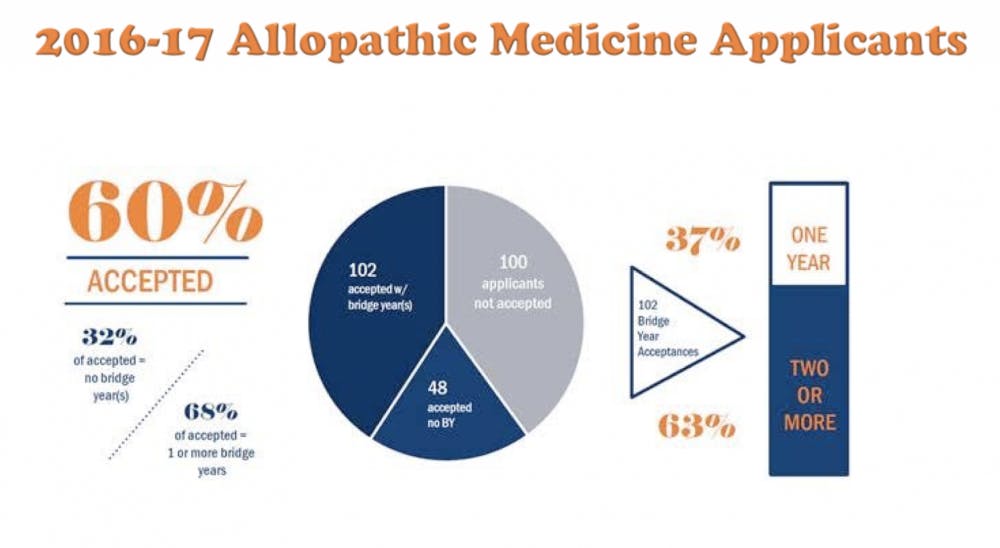For pre-health students, balancing academics, extracurricular activities, volunteering and research with preparation for the Medical College Admission Test and medical school application cycle may be overwhelming. Pre-health advisors and members of the Class of 2018 say that a bridge year — an alternative to directly applying and entering a health professional school following graduation — can allow students to create more opportunities and strengthen their candidacy for medical school or for other health professions.
Also known as a gap year, a bridge year lasts from graduation until the student’s entry to a health professional school — like medical school — in the following year or years. According to Kim Sauerwein, director of pre-health and law advising, a bridge year is not a backup plan or an alternative for students who did not do well at the University.
“A lot of very well-qualified applicants choose a bridge year to be able to engage in some kind of exciting or meaningful experience prior to medical school,” Sauerwein said.
Based on statistics provided by Sauerwein and the pre-health advising staff, most successful applicants to medical school take one or more bridge years prior to entering medical school. In the 2015-16 admissions cycle, a total of 52 percent of University applicants were accepted to an allopathic medical school — of these accepted students and alumni, 27.2 percent did not take a bridge year while 72.7 percent had one or more bridge years.
In the most recent 2016-17 application cycle, a total of 60 percent of University applicants were accepted to an allopathic medical school. Of these accepted students, 32 percent were accepted without a bridge year and 68 percent of the accepted students engaged in one or more bridge years. Furthermore, of the bridge year acceptances last year, 37 percent of the bridge years lasted only one year while 63 percent were two or more years in length.
Sauerwein attributed the increase in medical school acceptances from 52 percent to 60 percent to the good choices students made about when about they were applying to medical programs. The University’s pre-health advising center assesses a student’s candidacy for medical school based on a three-pillar model that emphasizes academic, career and personal development.
“If in third or fourth year, someone is saying, ‘I’m not sure what to do in my bridge year,’ we look at the pillars and say, ‘Which one of these needs strengthening or which one of these can you have an amazing experience in and use to increase and strengthen your candidacy,’” Sauerwein said.
Maya Johnson, a fourth-year College student, decided in her first year at the University to eventually take a bridge year following graduation, a choice that made balancing her extracurriculars and academics more manageable. Johnson will spend her bridge year as a medical scribe in a doctor’s office in Richmond where she will be organizing medical records as well as following and taking notes for a doctor as he or she talks with patients. Johnson also hopes to apply to medical schools in the following year.
“With the bridge year, you’re not stressing to finish everything in three years,” Johnson said. “Before you begin another hard four years of medical school, you can take a break to better an aspect of your application and add to your life and educational goals.”
While some students use their bridge year to strengthen their academic or career preparation, others may apply to the Fulbright Scholar Program or pursue a once-in-a-lifetime opportunity that might not have been possible in the traditional, academic setting. For fourth-year College student and global development studies Maddie Rita, that once-in-a-lifetime opportunity will be studying reproductive health in Cambodia as a Luce Scholar.
Through the Luce Scholars Program, Rita will be working with a non-governmental organization called Reproductive Health Association of Cambodia while living in Phnom Penh for a year. She said hopes to broaden her understanding of healthcare by interacting with people afflicted with significant health challenges and learning about solutions compatible with their community’s needs. She also said she hopes to experience Cambodian culture and bond with the people sharing her residence in Phnom Penh.
Rita said directly going to medical school and staying in the United States without understanding how healthcare works in another cultural context may make it difficult to develop the cultural competency the U.S. healthcare system emphasizes that its physicians exhibit.
“I think that there’s a certain component of becoming a really good practitioner that you can only really cultivate through the experience of helping take care of people, connecting with people who may be from a frame of reference that’s really different from your own and getting to spend time around people who are experts in their fields,” Rita said.
Ultimately, Rita said she hopes to take two years off before starting medical school — in her first year, she hopes to spend all of her energy on Cambodia while focusing more intently on the application process in her second year.







